Global Economic Growth Drives Energy Sector Demand Upward
Commodities / Energy Resources Jun 15, 2008 - 09:24 AM GMTBy: Joseph_Dancy

 As the cost of crude oil has soared in recent years, the amount produced hasn't kept pace with demand. Worldwide oil production has barely budged, despite record prices. Since 2004 the price of oil has gone from $33 per barrel to $132 – meanwhile production has risen just 1.8 percent, to 84.6 million barrels per day.
As the cost of crude oil has soared in recent years, the amount produced hasn't kept pace with demand. Worldwide oil production has barely budged, despite record prices. Since 2004 the price of oil has gone from $33 per barrel to $132 – meanwhile production has risen just 1.8 percent, to 84.6 million barrels per day.
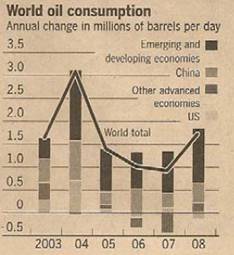 The need for oil is rising in parts of the world that, 20 years ago, used very little. Large, undeveloped oil fields are scarce. The fields that oil companies are finding now tend to be in hard-to-reach places, like the bottom of the ocean. And oil-rich countries have become much more assertive in their dealings with the major oil companies, sometimes insisting on business terms that make development uneconomic.
The need for oil is rising in parts of the world that, 20 years ago, used very little. Large, undeveloped oil fields are scarce. The fields that oil companies are finding now tend to be in hard-to-reach places, like the bottom of the ocean. And oil-rich countries have become much more assertive in their dealings with the major oil companies, sometimes insisting on business terms that make development uneconomic.
At the same time, prices for steel and other materials needed to build oil wells and offshore platforms have skyrocketed. Skilled oil field workers and engineers are in short supply. (Sfgate.com)
Last month the following developments occurred in the sector:
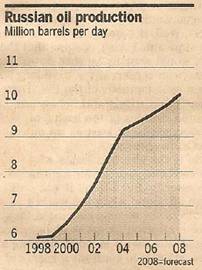 Non-Opec production is growing far less than expected. Russia 's output is declining for the first time in a decade, and a sharp supply drop has occurred in mature areas such as the North Sea and Mexico . At the same time, OPEC has started to cut output, reducing production by about 350,000 barrels a day between January and March according to the International Energy Agency. (Financial Times)
Non-Opec production is growing far less than expected. Russia 's output is declining for the first time in a decade, and a sharp supply drop has occurred in mature areas such as the North Sea and Mexico . At the same time, OPEC has started to cut output, reducing production by about 350,000 barrels a day between January and March according to the International Energy Agency. (Financial Times)
- Fueled by a surge in oil prices, Russia has turned into the hottest of the hot emerging markets. Automakers that can supply the right models in that market are very profitable, particularly in the early stages of the auto boom when demand is outstripping supply. In the past five years, Russian auto sales have tripled.
By 2010, many forecasters see Russia overtaking Germany to become Europe 's No. 1 auto market with sales of more than 4 million vehicles. "There's no sign that this is going to slow down," said Carlos Ghosn, CEO of Renault SA and Nissan. ( Detroit News)
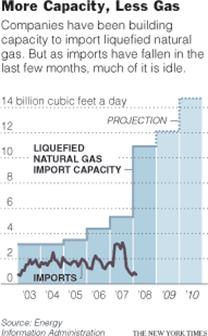 Drillers could access only 7 percent of known world reserves in 2005, down from 85 percent in 1970. Middle Eastern nations have taken control of their fields according to a report by the National Petroleum Council. The 13 members of the Organization of Petroleum Exporting Countries had 919 billion barrels of oil reserves as of 2006, or 76 percent of proved global reserves. Add Russia , the world's second-biggest producer, and the total rises to 83 percent. (Financial Times)
Drillers could access only 7 percent of known world reserves in 2005, down from 85 percent in 1970. Middle Eastern nations have taken control of their fields according to a report by the National Petroleum Council. The 13 members of the Organization of Petroleum Exporting Countries had 919 billion barrels of oil reserves as of 2006, or 76 percent of proved global reserves. Add Russia , the world's second-biggest producer, and the total rises to 83 percent. (Financial Times)
If US imports of liquefied natural gas remain at their current, record-low levels, the country's natural gas storage inventories are unlikely to be full by the end of the summer according to Goldman Sachs. U.S. LNG imports have continued to average below 1 Bcf/d. In addition, despite stronger-than-expected domestic production, natural gas demand seems equally strong, as underscored by the latest inventory builds. (Platts)
Higher prices for natural gas and LNG in Asia and Europe are drawing cargoes to those areas. Imports by Japan , the world's biggest LNG buyer, grew 19.4 percent in March from a year earlier. The decline in LNG imports to the U.S. will make the challenge of filling storage all that more formidable. LNG accounts for only about 3 percent of total U.S. natural gas consumption, so the fall in imports has made few headlines – but the decline in incremental supply should keep domestic prices firm.
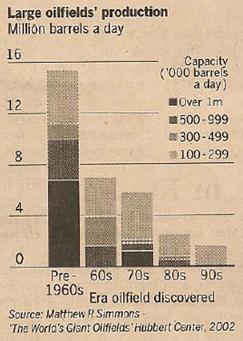 The rising price of oil is making international trade of heavy cargo prohibitively expensive and is acting as an incentive for importers to find products such as steel closer to home according to a new research report by CIBC World Markets. For heavy products, rising shipping costs are eroding the low-wage advantage of China over North America .
The rising price of oil is making international trade of heavy cargo prohibitively expensive and is acting as an incentive for importers to find products such as steel closer to home according to a new research report by CIBC World Markets. For heavy products, rising shipping costs are eroding the low-wage advantage of China over North America .
If oil prices continue to rise, the soaring cost of global transport will act like a major tariff barrier and lead to a substantial slow down in international trade, the study argues. (Globe & Mail)
- The underlying reason for oil's nearly tenfold price rise in less than 10 years is that demand, not least from China and India , has risen rapidly while supply has not kept pace. That dynamic is different to the supply shocks of the 1970s. Because truck drivers and commuters cannot easily stop traveling, even a small deficit in supply can cause large moves in the oil price. (Financial Times)
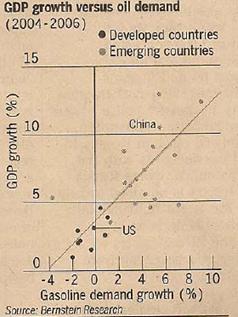 The International Energy Agency is studying 400 of the world's largest oil fields to understand at what rate their output is naturally depleting. ''We are trying to get a better understanding of depletion rates and expectations of productivity,'' according to the agency's deputy executive director. ''There is growing awareness that raising world output is a problem,'' but it is ''too early'' to give any estimates, he said. (Bloomberg)
The International Energy Agency is studying 400 of the world's largest oil fields to understand at what rate their output is naturally depleting. ''We are trying to get a better understanding of depletion rates and expectations of productivity,'' according to the agency's deputy executive director. ''There is growing awareness that raising world output is a problem,'' but it is ''too early'' to give any estimates, he said. (Bloomberg) - Petroleo Brasileiro SA , Brazil 's state-controlled oil company, will import the nation's first liquefied natural gas in July to meet rising power demand. Brazil follows Argentina as the second Latin American country this year to start imports of LNG, gas supercooled to a liquid for transport by ship. The region's biggest economy grew 5.4 percent in 2007, the fastest pace in three years, spurring energy consumption.
``The issue with Brazil is strong growth in power demand,'' said Frank Harris , head of global LNG at Edinburgh-based Wood Mackenzie Consultants Ltd. Brazil relies on hydropower for the majority of electricity generation and will import LNG during the dry season. Brazil consumed 50.8 million cubic meters of natural gas a day in 2007. That may rise to 134 million cubic meters a day by 2012 as more of the fuel is used for power generation. (Bloomberg)
U.S. natural gas storage levels are at the lowest levels for this time of year that we have seen for some time.
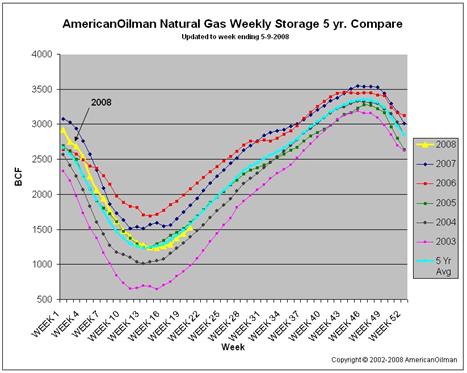
Storage levels the last two years were much higher at this point in the ‘shoulder season' than we have today, so the ability to fill the storage facilities before the next winter season was much easier last year. (American Oilman.com)
- In addition to the relatively low levels of storage, the independence Hub in the Gulf of Mexico has been shut down for two months while contractors deal with a leak. The shut in effectively removes 2% of U.S. natural gas supply, and 10% of Gulf of Mexico gas supply, from the system.
Offshore Gulf of Mexico production rates have been declining quite dramatically, and are forecast to continue to decline as many of the fields are mature and decline quickly. (Credit Suisse)
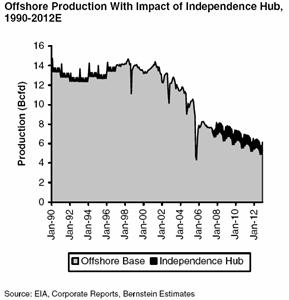
- World demand for natural gas has grown about 2.6 percent a year over the last decade. But in Asia, the Middle East, Latin America and Africa it has averaged 7 percent over the same period.
The growth in demand has made LNG prices much higher than expected, and has diverted imports to countries willing to pay a premium for natural gas supplies.
• Russia 's economy is expected to grow 7.1% this year. India 's economy is projected to grow 8.5%. China will grow around 10.0%. Middle Eastern economic growth will probably accelerate to 6.1% this year from 5.8% in 2007, according to the International Monetary Fund. Oil demand in the Middle Eastern region will surge 5.8 percent to 6.97 million barrels a day this year, according to the IEA. (Bloomberg)
Energy use and economic growth are highly correlated, so demand is expected to increase even with higher commodity prices.
By Joseph Dancy,
Adjunct Professor: Oil & Gas Law, SMU School of Law
Advisor, LSGI Market Letter
Email: jdancy@REMOVEsmu.edu
Copyright © 2008 Joseph Dancy - All Rights Reserved
Joseph R. Dancy, is manager of the LSGI Technology Venture Fund LP, a private mutual fund for SEC accredited investors formed to focus on the most inefficient part of the equity market. The goal of the LSGI Fund is to utilize applied financial theory to substantially outperform all the major market indexes over time.
He is a Trustee on the Michigan Tech Foundation, and is on the Finance Committee which oversees the management of that institutions endowment funds. He is also employed as an Adjunct Professor of Law by Southern Methodist University School of Law in Dallas, Texas, teaching Oil & Gas Law, Oil & Gas Environmental Law, and Environmental Law, and coaches ice hockey in the Junior Dallas Stars organization.
He has a B.S. in Metallurgical Engineering from Michigan Technological University, a MBA from the University of Michigan, and a J.D. from Oklahoma City University School of Law. Oklahoma City University named him and his wife as Distinguished Alumni.
Joseph Dancy Archive |
© 2005-2022 http://www.MarketOracle.co.uk - The Market Oracle is a FREE Daily Financial Markets Analysis & Forecasting online publication.


